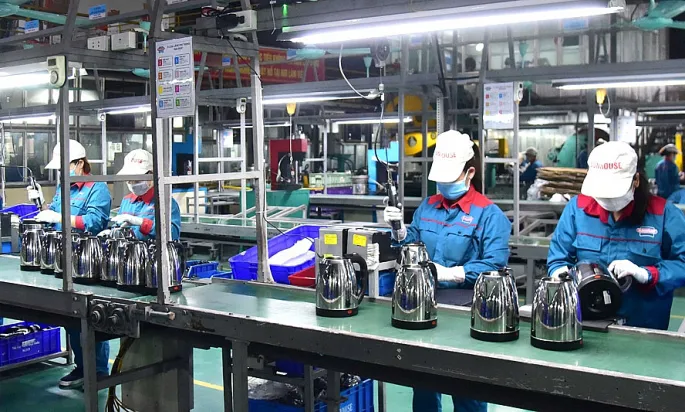Business confidence in Vietnam improves to a three-month high: S&P Global
Vietnam’s industrial production in 2023 is forecast to increase by 6.6% year on year.
Business confidence improved to a three-month high amid hopes that demand conditions will strengthen over the year, feeding through to the growth of output, according to S&P Global Vietnam.
| Household appliances production at Hanoi-based Sunhouse Group. File photo |
“The loosening of Covid-19 restrictions in Mainland China, plus signs that downturns in Europe and the US may be less severe than feared, provided optimism that growth in Vietnam could be around the corner,” said Andrew Harker, economic director at S&P Global Market Intelligence.
“S&P Global Market Intelligence is forecasting a rise in industrial production of 6.6% in 2023," he added.
In this regard, S&P Global’s latest survey pointed out more than half of respondents were optimistic that production will rise over the next 12 months.
According to Harker, although demand conditions for Vietnamese manufacturing firms remained challenging at the start of 2023, leading to further declines in output, new orders, and employment, there were some more positive signs as shown in its survey.
“One of the main positives in January was a renewed expansion in new export orders, with the decline in total new business softening as a result,” he said.
The S&P Global Vietnam Manufacturing Purchasing Managers' Index (PMI) posted 47.4 in January, up from 46.4 in December.
January data indicated a further sharp decline in manufacturing output, albeit slightly lower than in December. The decline in production is often explained by a decrease in new orders, as some companies indicated that their customers had sufficient inventories and therefore did not need to purchase for the time being.
Total new orders were down for the third month running in January as demand conditions remained challenging. That said, there were some signs of improvement, particularly regarding new export orders which rose for the first time in three months. As such, total new business fell at a modest pace that was the softest in the current period of decline.
In line with the picture from several other indicators from the survey, employment fell at a weaker pace at the start of the year. Staffing levels were down for the third month running amid lower output requirements.
Meanwhile, backlogs of work decreased in January, after having risen in December, and stocks of finished goods fell to the greatest extent since June 2021.
The rate of input cost inflation accelerated for the fifth successive month in January to the fastest since last July. Where input prices rose, experts mentioned higher supplier charges, increased import costs, and a rise in taxes. Consumer and intermediate goods firms saw input prices rise, but investment goods producers posted a fall.
Faster increases in input costs led manufacturers to raise their selling prices at the start of the year, having made efforts to reduce charges in the final two months of 2022. Selling prices were up modestly, with the pace of increase the fastest in six months.
The cost of raw materials, alongside falling workloads, meant that some firms lowered their purchasing activity again in January. Nevertheless, some signs of improvement in demand conditions encouraged other manufacturers to expand input buying, so that overall purchasing activity was broadly unchanged. Declines in the purchasing of inputs in previous months, however, led to a reduction in stocks of purchases.
Suppliers' delivery times shortened marginally, following slightly longer lead times in the two preceding months. Muted demand for inputs helped suppliers to speed up deliveries.
Hanoi’s index of industrial production (IIP) in January declined by 23.1% against the previous month and 10.8% year on year, according to the municipal Statistics Office. The agency attributed the declining manufacturing output to the week-long Tet break during the month, leading to fewer working days compared to previous months. Among the sectors, manufacturing, and processing fell by 24.8% on a monthly basis, followed by electricity production and distribution (-4%); water provision and waste treatment (-8.6%); mining (-24.4%). In addition, the number of employees working in industrial companies in late January declined by 0.1% against the previous month. |












